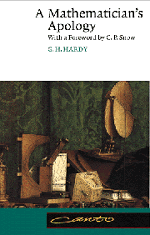Summary
THERE are then two mathematics. There is the real mathematics of the real mathematicians, and there is what I will call the ‘trivial’ mathematics, for want of a better word. The trivial mathematics may be justified by arguments which would appeal to Hogben, or other writers of his school, but there is no such defence for the real mathematics, which must be justified as art if it can be justified at all. There is nothing in the least paradoxical or unusual in this view, which is that held commonly by mathematicians.
We have still one more question to consider. We have concluded that the trivial mathematics is, on the whole, useful, and that the real mathematics, on the whole, is not; that the trivial mathematics does, and the real mathematics does not, ‘do good’ in a certain sense; but we have still to ask whether either sort of mathematics does harm. It would be paradoxical to suggest that mathematics of any sort does much harm in time of peace, so that we are driven to the consideration of the effects of mathematics on war. It is very difficult to argue such questions at all dispassionately now, and I should have preferred to avoid them; but some sort of discussion seems inevitable. Fortunately, it need not be a long one.
There is one comforting conclusion which is easy for a real mathematician. Real mathematics has no effects on war. No one has yet discovered any warlike purpose to be served by the theory of numbers or relativity, and it seems very unlikely that anyone will do so for many years.
- Type
- Chapter
- Information
- A Mathematician's Apology , pp. 139 - 143Publisher: Cambridge University PressPrint publication year: 1992

